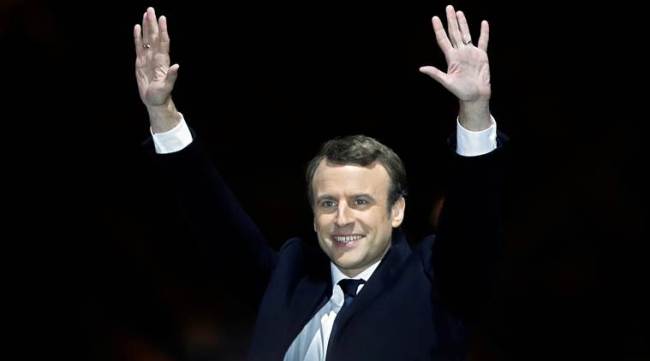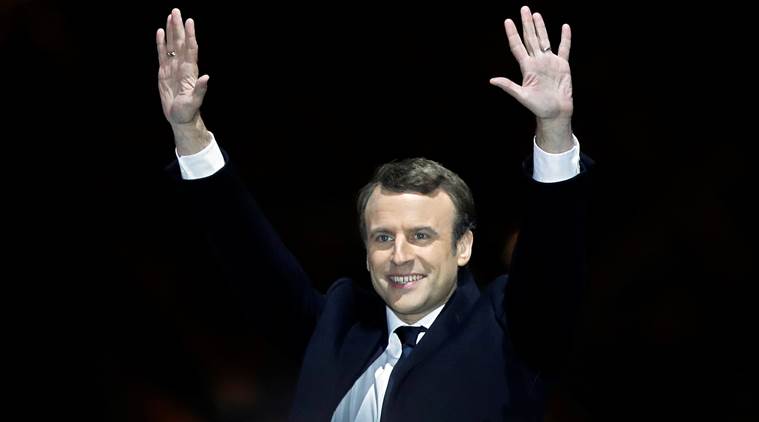Opinion These are the reasons why Macron’s win is unprecedented
Macron's win is unprecedented. To have a man who has never held an elected office before, win on a national scale, with a one-year-old party certainly sets a new record for France.
 French President-elect Emmanuel Macron. (Source: Reuters)
French President-elect Emmanuel Macron. (Source: Reuters)  French President-elect Emmanuel Macron celebrates on the stage at his victory rally near the Louvre in Paris, France May 7, 2017. REUTERS/Christian Hartmann TPX IMAGES OF THE DAY
French President-elect Emmanuel Macron celebrates on the stage at his victory rally near the Louvre in Paris, France May 7, 2017. REUTERS/Christian Hartmann TPX IMAGES OF THE DAY
At 39, Emmanuel Macron, politically unknown three years ago, has had a divisive victory, winning by 65.1 percent votes against his far-right political opponent, Marine Le Pen. By now you probably know the basics: a former investment banker, Macron never held an elected political office, which means this was the first time he was standing for the elections. He started his independent party, En Marche! (Onwards), back in April 2016 to establish his own political crusade against “the establishment”. Macron, today backed vociferously by outgoing President Francois Hollande, began his political career in Hollande’s Socialist Party. Interestingly, Macron only crept into French public consciousness when he decided to pull out of Hollande’s party.
Recent history could serve as evidence that the wave of populism, fierce nationalism and anti-immigration angst had gained considerable momentum in several countries. So far, it had largely been spinning the political narrative – from Britain’s unanimous vote to exit the European Union to the divisive election of President Donald J. Trump in the United States – the belief many held was that France would concede to the overwhelming aggressive right-wing phenomenon.
Macron’s win, therefore, seems to be a breath of fresh air for the liberals. At the same time, his win is unprecedented. To have a man who has never held an elected office before, win on a national scale, with a one-year-old party certainly sets a new record for France.
But here’s one more important fact: as of now, En Marche! has absolutely no seats in the French Parliament’s 577 seats. Which principally means this: While France revels in its victory for electing a centrist maverick for President, that victory barely amounts to much, unless the newly elected President gains a majority in Parliament, which will help him implement his future programmes.
Interestingly though, according to a Reuters report, a recent poll (OpinionWay-SLPV Analytics) commissioned by the French newspaper Les Echos, predicts that Macron’s party will easily manage to win 249-286 seats. The National Front would be able to grab 15-25 seats, the Socialist left 28-43, while the conservatives would go on to win about 200-210 seats. As of now, Le Pen’s National Front holds only two seats in parliament.
Macron’s win, however, is not surprising. During the first round of elections, he took the lead with 23.8 per cent, while far-right Le Pen followed closely behind with 21.5 per cent. Round two, was expected to go to Macron, who, analysts observed, would be attracting not only the left-inclined voters, but also the right-leaning who had earlier voted for center-right François Fillon (former French Prime Minister) in the first round.
Certain experts claim that Macron’s meteroic rise began only four months ago. At that time, he was floppily lagging behind in third place — his campaign rallies were uneventful, while his speeches were banal. However, when Fillion’s campaign buckled under an embezzlement controversy, it served as a springboard for Macron to enter the prominent political limelight. In effect, the right wing French voters turned, rather unwillingly, towards Macron, for a majority of them did not want Le Pen to govern their country (National Front was still struggling to undo what her father, Jean-Marie Le Pen had done when he was the head of the party).
In addition, Le Pen had been vocal about a possible Frexit earlier – she had even been dubbed ‘Madam Frexit’ in the past. However, even though Frexit seemed like a possible idea, it highly seemed unlikely, since it would require a constitutional change. Even then, Le Pen’s “France first” policy, which was positioned to fixing the high unemployment situation in France, irked financial markets – for if implemented, the policy could have been brutal for the euro, including the European Union.
The pro-business Macron, on the other hand, supported a competitive open economy as well as the idea that France should remain in Europe. In his victory speech he said, “I will defend Europe; it s our civilisation which is at stake…I will work to rebuild ties between Europe and its citizens. Moreover, Macron posed himself as a young man, with economic acumen (he was the Minister of Economy, Industry and Digital Data in 2014, under Hollande’s government), that could personally reformat a crumbling French political system and economy.
In the battle between nationalism and globalisation, closed and open, old and new, Frexit and EU, France chose the latter. While this win for Macron sets a new precedent, it is the parliamentary vote in June, which will reveal how much power Macron can truly wield.






